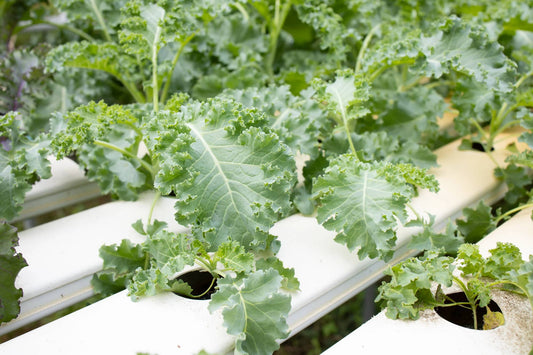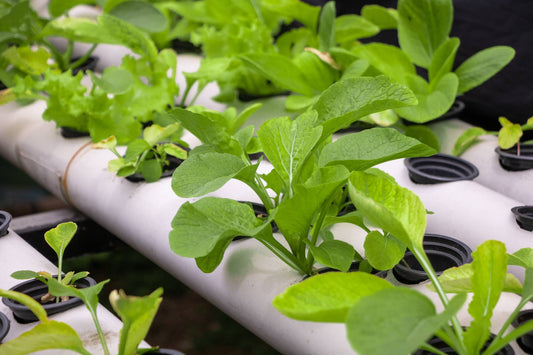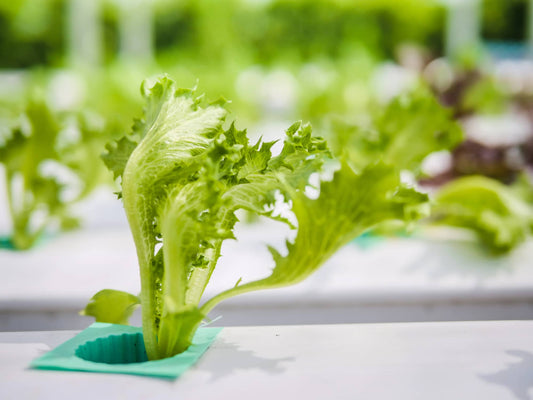Eggplants, recognized for their deep purple hues and rich texture, thrive exceptionally well in hydroponic systems. This method eliminates common soil-based challenges, facilitating faster growth, controlled nutrient delivery, and higher yields. Hydroponic eggplants mature rapidly, making them an excellent addition to any indoor garden or greenhouse setup. Whether you're cultivating them for personal use or commercial production, hydroponic cultivation ensures a consistent supply of flavorful and nutritious eggplants throughout the year. This guide outlines essential growing conditions, nutrient management, and best practices for optimizing your hydroponic eggplant production.
Health Benefits of Hydroponic Eggplant
- Digestive Health – The fibre content in eggplant supports gut health by promoting regular digestion and aiding in nutrient absorption.
- Rich in Antioxidants – Eggplants contain nasunin, an antioxidant that protects brain cells, supports cognitive function, and combats oxidative stress.
- Heart Health – High in fiber, potassium, vitamin C, and vitamin B6, eggplants contribute to cardiovascular health by lowering blood pressure and improving circulation
- .Full of Vitamins – Eggplants provide an array of vitamins and minerals essential for overall wellness, making them a nutritious addition to any diet.
Growing Hydroponic Eggplant: A Step-by-Step Guide
Eggplant Growth Stages
- Germination – Takes approximately 7–14 days with optimal moisture and temperature conditions.
- Seedling to Mature Plant – Typically requires 40–50 days as the plant establishes strong stems and leaves.
- Flowering and Fruit Development – Occurs 50–80 days after planting, leading to fruit formation.
- Harvest – Begins around 100–120 days from seeding, depending on the variety and growing conditions.
Environmental Conditions for Maximum Yield
- Planting Season: Eggplants thrive in warm conditions and are typically planted in late spring when grown outdoors. In hydroponic systems, they can be cultivated year-round.
- Temperature: Maintain daytime temperatures between 75°F to 85°F (24°C to 29°C) and nighttime temperatures of 65°F to 75°F (18°C to 24°C).
- Humidity: A relative humidity range of 40% to 60% is ideal, ensuring proper transpiration and reducing the risk of fungal diseases.
- Light Requirements: Eggplants require 6–8 hours of direct sunlight daily. Provide a DLI range of 20–30 mol/m²/day for indoor hydroponics to support strong vegetative growth and fruiting.
Essential Nutrient and pH Levels
Recommended EC Levels:
- Seedling Stage: Begin with an EC of 2.5 mS/cm to promote early root and leaf development.
- Vegetative Growth: Increase EC to 3.0 mS/cm to support healthy plant expansion and fruit formation.
- Fruiting Stage: Adjust EC to 3.5 mS/cm to enhance fruit size and quality while ensuring proper nutrient absorption.
pH Range:
- Maintain a pH between 5.5 and 6.5 to optimize nutrient availability and plant health.
Key Practices for Thriving Hydroponic Eggplants
Staking and Support: Utilize stakes or cages to offer structural support for eggplant stems, preventing bending or breaking under the weight of the fruit.
Selective Pruning: Remove excess foliage and suckers to enhance air circulation and light penetration, promoting larger and healthier eggplants
Harvest Timing: Harvest eggplants when their skin is glossy and firm. Overripe eggplants develop bitter seeds and tough skin, so picking at the right time ensures optimal flavor and texture.
Ensuring Proper Pollination
Eggplants possess self-pollinating flowers but can benefit from gently shaking the flower stems or transferring pollen manually with a soft brush. This technique improves fruit set in controlled hydroponic environments.
Popular Hydroponic Eggplant Varieties
- Globe – A large, round variety commonly used in grilling and stews.
- Japanese – Long and slender with a mild, slightly sweet flavor.
- Chinese – Similar to Japanese eggplants but with a more tender texture.
- Italian – Traditional eggplant with a smooth, deep purple exterior.
- White – A unique variety known for its creamy-white skin and mild taste.
- Graffiti – A visually striking variety with purple and white streaks, offering a rich flavor.
Final Thoughts on Growing Hydroponic Eggplant
Hydroponic eggplant cultivation is an efficient, space-saving method for producing high-quality, nutrient-rich fruits. By managing environmental conditions, providing an adequate nutrient balance, and implementing proper pruning techniques, growers can enjoy a reliable supply of eggplants throughout the year. Whether growing for home use or large-scale production, hydroponic systems offer a sustainable and effective way to cultivate this versatile vegetable.




